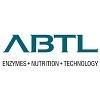
Content sponsored by:
ABTL Advanced Bio-Agro Tech Ltd
Systemic Enzymes: A Cover Against Heat Stress
Published: June 14, 2023
By: ABTL Enzymes. Contact: Sumit Sipany
Introduction
Summer and Disease
The mercury is soaring high throughout the country, and it seems there is no respite soon. High environmental temperature leads to heat stress. Heat stress can lead to various harmful impacts on livestock productivity, such as high animal morbidity, mortality, and reduction in growth performance, directly resulting in dramatic economic losses to the livestock industry. Heat stress and transportation or shifting from EC shed to the meat processing unit, leads to meat quality deterioration.
Compared with other animals, poultry is more sensitive to heat stress. Poultry has no sweat glands, and respiratory hyperventilation is poultry's primary mechanism of dissipating heat.
Due to heat stress the poultry undergo physiological changes which are characterized by the redistribution of blood toward the periphery to dissipate heat, with a consequent decline in blood flow and oxygen and nutrient supply to splanchnic tissues. Metabolic adaptations and gut dysfunction lead to oxidative stress, translocation of lumen contents, and release of proinflammatory mediators, activating a systemic Antioxidant Stress inflammatory response, if not managed properly it will make the birds more prone to infectious diseases.
Impact of heat stress and the antioxidant defence system
Antioxidant systems consist of enzymatic and non-enzymatic parts. Under acute heat stress, reactive oxygen species (ROS) level in the body is rapidly increased and the antioxidant enzyme system also responds rapidly, by significantly increasing its activity. However, chronic heat stress can break the antioxidant enzyme system and cause ROS accumulation in the body to induce oxidative stress by decreasing the activity of enzymes.
Besides the antioxidant enzyme system, there is an antioxidant non-enzyme system that includes vitamins, GSH, carotenoids, and microelements and is obtained from feed. These nonenzyme substances participate in biotransformation in the body. Under heat stress, the feed intake of poultry is reduced and thus the intake of non-enzymatic substances will be decreased, which results in oxidative stress making poultry more prone to infection.

Why disease incidence is more in summer?
-Heat stress alters immunity thereby immunosuppressing effects leading to susceptibility to pathogens and disease outbreaks.
-During the summer season vaccine failures is more common.
-Heat stress leads to reduced feed consumption, lower body weight gain, high feed conversion ratio (FCR), and dehydration.
-Heat stress causes a variety of changes in GIT including alteration of the gut microbiota, decreased integrity of the intestinal epithelium, and increase in enteric infections.
-An increase in energy demands, increased culls, and high mortality are observed due to heat stress.
What are the common poultry diseases during summer?
The most common infections that occur are in the table below. Vaccine reactions can occur in hyperventilating birds because of heat stress. Vaccination failure is mainly because of stress like extreme temperature or relative humidity causing immunosuppression.
Common diseases during summer season:
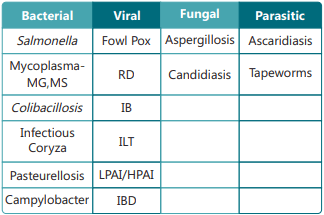
Impact of heat stress on meat quality
Meat, the product of broiler farming, is influenced by heat stress. During the summer season, the cases of Pale Soft Exudative (PSE) meat were more. PSE meat is characterized by an abnormal colour, consistency, and water-holding capacity, making the meat dry and unattractive to consumers. Transport distance affected adversely some meat quality characteristics and this effect was most pronounced in the summer season.
The Profitable Solution
Immunotech is a blend of systemic enzymes and polyphenol which makes it a potent immunomodulator, anti-inflammatory, and anti-oxidant agent. The uniqueness of IMMUNOTECH, not only modulates immunity but also helps in resolving inflammation reducing stress and improving meat quality.
How it works
IMMUNOTECH revitalizes 'a crashed immune system' to normalcy and hence aids in the fight against infection. It acts in many ways as stated below:
On Immunity
-The enzymes present in IMMUNOTECH cleave the antigenic surface protein of organisms and digest their outer coat and the released enzyme-surface protein complex is ingested by macrophages and dendritic cells and induces higher antibody production.
-It hampers the pathogen attachment site by reducing the receptors for pathogens on host cells and thus, infectivity decreases.
-IMMUNOTECH when given as a prophylactic measure act as a “biological vacuum cleaner” by detoxifying the blood and removing viruses from circulation. This greatly diminishes the inflammatory response and allows normal immune functions to operate at a much healthier level.
-IMMUNOTECH causes the enhancement of immune cells to kill bacteria, viruses, molds, and fungi.
-The systemic enzymes in IMMUNOTECH break down immune complexes and eliminate them from circulation paving the way for the immune cell's action.
-IMMUNOTECH enhances the bactericidal effect of antibiotics and prevents the formation of biofilms.
As Antioxidant
-Polyphenols such as rutin are powerful antioxidants and effectively combat the harmful free radicals generated by any means such as a change in temperature, transportation, etc.
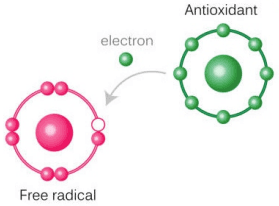
As Anti-inflammatory
-IMMUNOTECH at the molecular level block proinflammatory metabolites that propagate the inflammation
The enzymes modulate the arachidonate pathway in such a way that thromboxane production is decreased with no effect on cyclooxygenase. This leads to a decrease in edema and inflammation and reestablishment of balance between the 2 types of prostaglandins. It also accelerates the volume and fluidity of blood flow. This facilitates the elimination of inflammatory product.
-Enzymes activate alpha-2 macroglobulin, the cytokine catcher which usually exists in blood in an inactive form (slow form). This in turn promotes faster clearance of cytokine, TNF-a. Thus, stimulus for the expression of the adhesion molecules is reduced.
-IMMUNOTECH possess anti-secretory and mucolytic qualities and decreases the volume and viscosity of infected secretions so that they can be easily coughed out thus aids in breathing.
-IMMUNOTECH reduces the stress and the proteolytic enzymes degrade collagen fibre thus improving the meat quality.
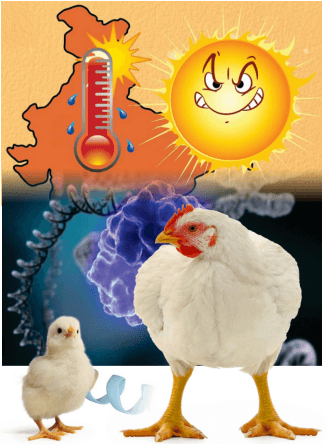
Role of Immunotech in infection
-Airway Infection and Inflammation: Serratiopeptidase is effective in alleviating thick infected respiratory secretions. Serratiopeptidase acts rapidly to reduce local inflammation and is also beneficial in cases of bronchitis and other chronic lower airway diseases. Bromelain is effective and safe in acute sinusitis. It decreases pain and throat pain. It changes the consistency of nasal mucus favorably.
-Sepsis and Septic Shock: IMMUNOTECH when used in conjunction with appropriate antibiotics can lead to early recovery from sepsis. Bromelain and Papain have also been found to enhance the chemotherapeutic efficacy of antibiotics
-Joint Infection: Intraarticular serratiopeptidase enzyme has also been found useful in the eradication of infection caused by biofilm-forming bacteria.
-Viral Hepatitis: IMMUNOTECH is useful in hepatitis infection. When administered, they tended to lead to faster recovery with early normalization of spleen and liver size and restoration of liver function. IMMUNOTECH can attack and disrupt the proteins in virus cell walls, thereby preventing the virus from reproducing or attacking important cells in the body.
-Fungal Infection: Crop Mycosis is an opportunistic infection caused by Candida sps. Systemic enzyme like Bromelain has been found to enhance the killing activity of white blood cells against Candida spp.
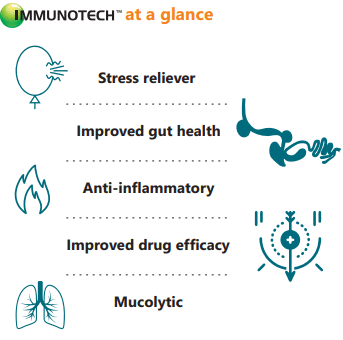
Related topics:
Authors:
ABTL Advanced Bio-Agro Tech Ltd
Recommend
Comment
Share
ABTL Advanced Bio-Agro Tech Ltd
7 de julio de 2023
Heat stress results from a negative balance between the net amount of energy flowing from the animal's body to its surrounding environment and the amount of heat energy produced by the animal. Poultry seems to be particularly sensitive to temperature-associated environmental challenges, especially heat stress. It has been suggested that modern poultry genotypes produce more body heat, due to their greater metabolic activity as the temperature rises
more and more, the bird's body attempts to maintain its thermal homeostasis, increased levels of reactive oxygen species (ROS) occur. Therefore, the body enters a stage of oxidative stress and compromise the normal functioning of various organs of the body.
Recommend
Reply
ABTL Advanced Bio-Agro Tech Ltd
20 de junio de 2023
1. Immunity is very important for birds to fight against pathogenic microbes, maintaining good health & well being of birds.
2. Stress free & immunized birds are the main target in poultry production.
3. Systemic enzymes reduce the impact of disease stress & its secondary complications.
4. Systemic enzymes help to speed the resolution of fibrin, clear out cellular waste from the blood to support normal liver function & boost the immune system.
5. Systemic enzymes are perfectly safe & free from all the dangerous side effects.
6. When birds are completely FIT, there will be a great PROFIT.
Recommend
Reply

Would you like to discuss another topic? Create a new post to engage with experts in the community.


.jpg&w=3840&q=75)